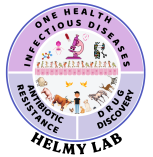Welcome to Helmy Lab
Research Focus
Our mission is to advance the understanding and control of infectious diseases through an integrated One Health approach that connects human, animal, and environmental health. We are committed to combating the global threat of antimicrobial resistance (AMR) by developing innovative, sustainable, and translational solutions, ranging from next-generation probiotics to targeted small molecules and genomic surveillance strategies.
Our research bridges fundamental science and real-world applications, with a focus on:
Pathogen Surveillance — Tracking emerging zoonotic diseases and antimicrobial resistance (AMR) trends.
Antibiotic Alternatives — Developing probiotics, phage therapies, and quorum-sensing inhibitors.
Microbiome & Immunity — Studying how gut microbes affect host immunity and disease resistance.
Translational Research — Applying science to real-world problems in agriculture, food safety, and equine health.
Lab Values
Collaboration
Mentorship
Innovation
